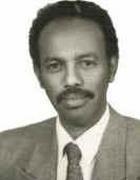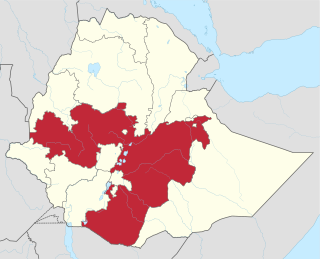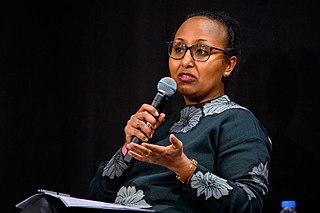Related Research Articles

Seven Beauties is a 1975 historical black comedy drama Italian film written and directed by Lina Wertmüller and starring Giancarlo Giannini, Fernando Rey, and Shirley Stoler.
Senait Ghebrehiwet Mehari is an Eritrean-born German singer. She goes professionally by her single name "Senait". She is also known as Senait Mehari, although this is a common understanding and is due to the Europeanization of an Eritrean naming convention.

Rome, Open City, also released as Open City, is a 1945 Italian neorealist war drama film directed by Roberto Rossellini and co-written by Sergio Amidei, Celeste Negarville and Federico Fellini. Set in Rome in 1944, the film follows a diverse group of characters coping under the Nazi occupation, and centers on a Resistance fighter trying to escape the city with the help of a Catholic priest. The title refers to the status of Rome as an open city following its declaration as such on 14 August 1943. The film is the first in Rosselini's "Neorealist Trilogy", followed by Paisan (1946) and Germany, Year Zero (1948).
Ali Said Abdella was an Eritrean rebel commander, politician and diplomat, who at the time of his death was serving as Minister of Foreign Affairs of Eritrea.

The Eritrean War of Independence was a decades-long insurgency aimed at achieving self-determination and independence for Eritrea from Ethiopian rule. Starting in 1961, Eritrean insurgents engaged in guerrilla warfare to liberate Eritrea Province from the control of the Ethiopian Empire under Haile Selassie and later the Derg under Mengistu. Their efforts ultimately succeeded in 1991 with the fall of the Derg regime.

For Whom the Bell Tolls is a 1943 American epic war film produced and directed by Sam Wood and starring Gary Cooper, Ingrid Bergman, Akim Tamiroff, Katina Paxinou and Joseph Calleia. The screenwriter Dudley Nichols based his script on the 1940 novel For Whom the Bell Tolls by American novelist Ernest Hemingway. The film is about an American International Brigades volunteer, Robert Jordan (Cooper), who is fighting in the Spanish Civil War against the fascists. During his desperate mission to blow up a strategically important bridge to protect Republican forces, Jordan falls in love with a young woman guerrilla fighter (Bergman).

Petros Solomon is an Eritrean politician. He was an Eritrean People's Liberation Front commander and played a key role during the Eritrean War of Independence, following independence he served in several positions in the Cabinet, including Minister of Defense and Minister of Foreign Affairs.
Mesfin Hagos is an Eritrean who was one of the founding members of the Eritrean People's Liberation Front (EPLF). In government, he was the Eritrean Minister of Defense during the 1990s.

Sundays and Cybèle is a 1962 French drama film in Franscope, directed by Serge Bourguignon. Its original French title is Les dimanches de Ville d'Avray, referring to the Ville-d'Avray suburb of Paris. The film tells the tragic story of a young girl who is befriended by an innocent but emotionally disabled veteran of the French Indochina War. The film is based on a novel by Bernard Eschasseriaux, who collaborated on the screenplay.
The Battle of Afabet was a three-day battle fought from 17 March through 20 March 1988 in and around the town of Afabet, as part of the Eritrean War of Independence. The battle has been described as being the largest battle in Africa since the Second Battle of El Alamein. It has been described as the most significant battle in terms of military and political consequences since the Ethio-Somali War, alongside the 1989 Battle of Shire of the Ethiopian Civil War.
The Eritrean Navy is a smaller branch of the Eritrean Defence Forces. It is responsible for the security of the entire coastline of Eritrea, more than 1,100 km, as well as the Eritrean territorial waters.

The Eritrean Civil Wars were two conflicts that were fought between competing organizations for the liberation of Eritrea.

Intimate Enemies is a 2007 French war film directed by Florent-Emilio Siri, starring Benoît Magimel and Albert Dupontel. It was filmed in France and Morocco.

Roland Paulze d'Ivoy de la Poype, was a Second World War fighter ace, a member of the Normandie-Niemen fighter group that fought on the Soviet front.

Dahab Faytinga, known professionally as Faytinga, is an Eritrean singer and musician. She belongs to the Nilotic Kunama and Tigrinya ethnic groups.

The Oromo conflict is a protracted conflict between the Oromo Liberation Front (OLF) and the Ethiopian government. The Oromo Liberation Front formed to fight the Ethiopian Empire to liberate the Oromo people and establish an independent state of Oromia. The conflict began in 1973, when Oromo nationalists established the OLF and its armed wing, the Oromo Liberation Army (OLA). These groups formed in response to prejudice against the Oromo people during the Haile Selassie and Derg era, when their language was banned from public administration, courts, church and schools, and the stereotype of Oromo people as a hindrance to expanding Ethiopian national identity.

Sweetness in the Belly is a 2019 drama film directed by Zeresenay Berhane Mehari, based on the novel of the same name by Camilla Gibb.
Letekidan Micael is an Eritrean actress. She is notable for the role 'Awet' in the critically acclaim film Feuerherz.

Nikolai Ivanovich Galushkin was one of the top Soviet snipers during World War II. Despite tallying 418 fascists during the war and being nominated for the title Hero of the Soviet Union on two occasions, he did not receive the title, and was instead awarded the Order of Lenin for his achievements as a sniper until being awarded the title Hero of the Russian Federation on June 21, 1995.

Awet Tesfaiesus is a German politician from Alliance 90/The Greens who has served as a member of the Bundestag from the state of Hesse since 2021. Previously a lawyer who represented asylum seekers and refugees, Tesfaiesus was elected as a city councillor for the city of Kassel in 2016. Tesfaiesus was elected in the 2021 German federal election as a member of the Green Party list in the state of Hesse. She is the first black woman to ever be elected to the Bundestag.
References
- ↑ "BetaCinema Heart of Fire" (PDF). Archived from the original (PDF) on 4 March 2016.
- ↑ "Rotten Tomatoes Heart of Fire".